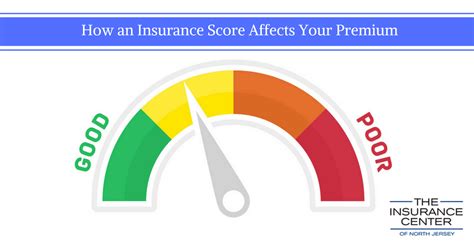Insurance Score

In the realm of risk assessment and financial services, the concept of an Insurance Score plays a pivotal role in determining an individual's or entity's eligibility and pricing for various insurance products. This score, a sophisticated metric, is more than just a numerical value; it is a powerful indicator of potential risks and opportunities within the insurance landscape. As we delve into the intricacies of Insurance Scores, we uncover a multifaceted tool that shapes the insurance industry's approach to underwriting, pricing, and risk management.
Unveiling the Insurance Score: A Comprehensive Overview

The Insurance Score, a relatively modern innovation in risk assessment, has revolutionized the way insurance companies evaluate potential clients. This score is not merely a reflection of an individual’s financial history or credit score; it is a complex algorithm that considers a wide array of factors to predict an applicant’s likelihood of filing an insurance claim.
At its core, the Insurance Score is a predictive model, designed to anticipate future behaviors and outcomes. Insurance companies utilize this score to assess the risk associated with insuring an individual or business, which in turn influences the premium rates and coverage options offered. The score is a dynamic tool, continuously evolving with the influx of new data and advancements in predictive analytics.
The Evolution of Insurance Scoring
The concept of Insurance Scoring has evolved significantly over the years. Initially, insurance companies relied heavily on traditional credit scores as a proxy for assessing risk. However, with the advent of advanced data analytics and machine learning, the industry recognized the need for a more comprehensive and nuanced approach.
Modern Insurance Scores now incorporate a vast array of data points, ranging from traditional credit history to more nuanced factors such as geographic location, demographic information, and even social media behavior. This holistic approach allows insurance companies to make more accurate predictions about an individual's potential risk profile.
| Factor | Description |
|---|---|
| Credit History | A key indicator of financial responsibility, used as a foundation for many Insurance Scores. |
| Geographic Location | Influences risk factors such as crime rates, natural disasters, and healthcare accessibility. |
| Demographic Information | Factors like age, gender, and marital status can impact insurance needs and risk levels. |
| Social Media Behavior | Analysis of online activity can provide insights into lifestyle choices and potential risks. |

How Insurance Scores Impact Insurance Policies

The Insurance Score has a profound impact on the insurance landscape, influencing everything from the types of policies offered to the premiums an individual or business pays. Let’s explore these impacts in more detail.
Underwriting and Policy Selection
Insurance companies use Insurance Scores as a critical tool in the underwriting process. This score helps underwriters determine an applicant’s eligibility for different types of insurance policies. For instance, an individual with a high Insurance Score may be considered a low-risk candidate and offered a broader range of coverage options at more competitive rates.
On the other hand, those with lower Insurance Scores may face challenges in obtaining certain types of insurance or may be required to pay higher premiums to offset the perceived higher risk.
Pricing and Premium Determination
The Insurance Score is a primary factor in determining insurance premiums. Insurance companies use this score to assess the potential risk associated with insuring an individual or business and then set premiums accordingly. Higher scores generally result in lower premiums, as these individuals are perceived as less likely to file claims.
It's important to note that while Insurance Scores play a significant role in premium determination, other factors such as the type of coverage, policy limits, and deductibles also influence the final premium amount.
Risk Management and Mitigation
Insurance Scores provide valuable insights for risk management strategies. By identifying high-risk individuals or entities, insurance companies can implement targeted risk mitigation measures. This might include offering educational resources, providing incentives for risk reduction, or suggesting specific coverage options to better manage potential risks.
For example, an individual with a high Insurance Score in a high-risk geographic area might be encouraged to explore additional coverage options, such as flood insurance, to better protect their assets.
The Future of Insurance Scoring: Emerging Trends and Technologies
The field of Insurance Scoring is continually evolving, driven by advancements in data analytics and machine learning. As we look to the future, several key trends and technologies are poised to shape the landscape of risk assessment and insurance scoring.
Artificial Intelligence and Machine Learning
Artificial Intelligence (AI) and Machine Learning (ML) are revolutionizing the insurance industry. These technologies enable insurance companies to process vast amounts of data, identify complex patterns, and make more accurate predictions about risk. AI-powered algorithms can continuously learn and adapt, improving the accuracy and effectiveness of Insurance Scores over time.
Behavioral Analytics
Behavioral analytics is an emerging field that focuses on understanding and predicting human behavior. In the context of Insurance Scoring, this involves analyzing an individual’s behavior patterns, both online and offline, to assess their risk profile. For instance, an individual’s driving behavior, as captured by telematics devices, can provide valuable insights into their risk of being involved in an accident.
Big Data and Advanced Analytics
The insurance industry is increasingly harnessing the power of Big Data to enhance its risk assessment capabilities. By collecting and analyzing vast amounts of data from various sources, insurance companies can develop more sophisticated Insurance Scores. This data-driven approach allows for a more nuanced understanding of risk, leading to more accurate pricing and coverage decisions.
InsurTech Innovations
The rise of InsurTech (insurance technology) startups is driving innovation in the insurance industry. These companies are leveraging cutting-edge technologies to develop new risk assessment models and Insurance Scores. For instance, some InsurTech firms are using blockchain technology to create immutable records of insurance transactions, enhancing transparency and security in the insurance process.
Conclusion: Navigating the Complex World of Insurance Scoring
The Insurance Score is a powerful tool in the insurance industry’s arsenal, offering a comprehensive and nuanced approach to risk assessment and management. As we’ve explored, this score influences everything from policy selection and pricing to risk mitigation strategies. With the continuous evolution of data analytics and emerging technologies, the future of Insurance Scoring looks promising, offering more accurate and personalized risk assessments.
However, it's crucial to approach Insurance Scoring with a balanced perspective. While these scores provide valuable insights, they are just one piece of the complex puzzle that is risk assessment. A holistic understanding of an individual's unique circumstances, coupled with ethical and responsible data handling practices, is essential for fair and accurate risk profiling.
As the insurance industry continues to embrace innovation, it must also prioritize transparency, consumer education, and ethical considerations to ensure that Insurance Scoring remains a force for good in the industry's evolution.
How is an Insurance Score different from a credit score?
+While a credit score primarily assesses an individual’s financial history and creditworthiness, an Insurance Score is a more holistic evaluation. It considers a broader range of factors, including credit history, geographic location, demographic information, and even social media behavior, to predict an individual’s likelihood of filing an insurance claim.
Can my Insurance Score improve over time?
+Absolutely! Insurance Scores are dynamic and can improve or decline based on various factors. Positive changes in your financial behavior, such as maintaining a good credit history, improving your driving record, or reducing your exposure to potential risks, can all lead to an improved Insurance Score over time.
How can I access my Insurance Score?
+Insurance Scores are typically not publicly available, and insurance companies often keep them proprietary. However, you can request this information from your insurance provider. Some third-party services also offer Insurance Score estimates, but it’s important to verify the accuracy and reliability of these sources.



